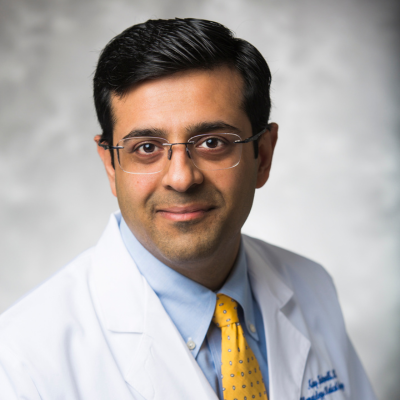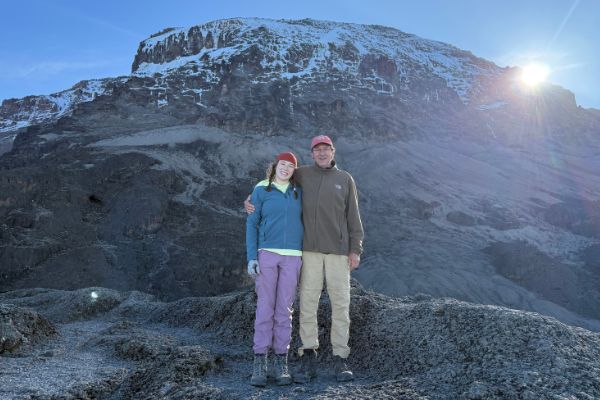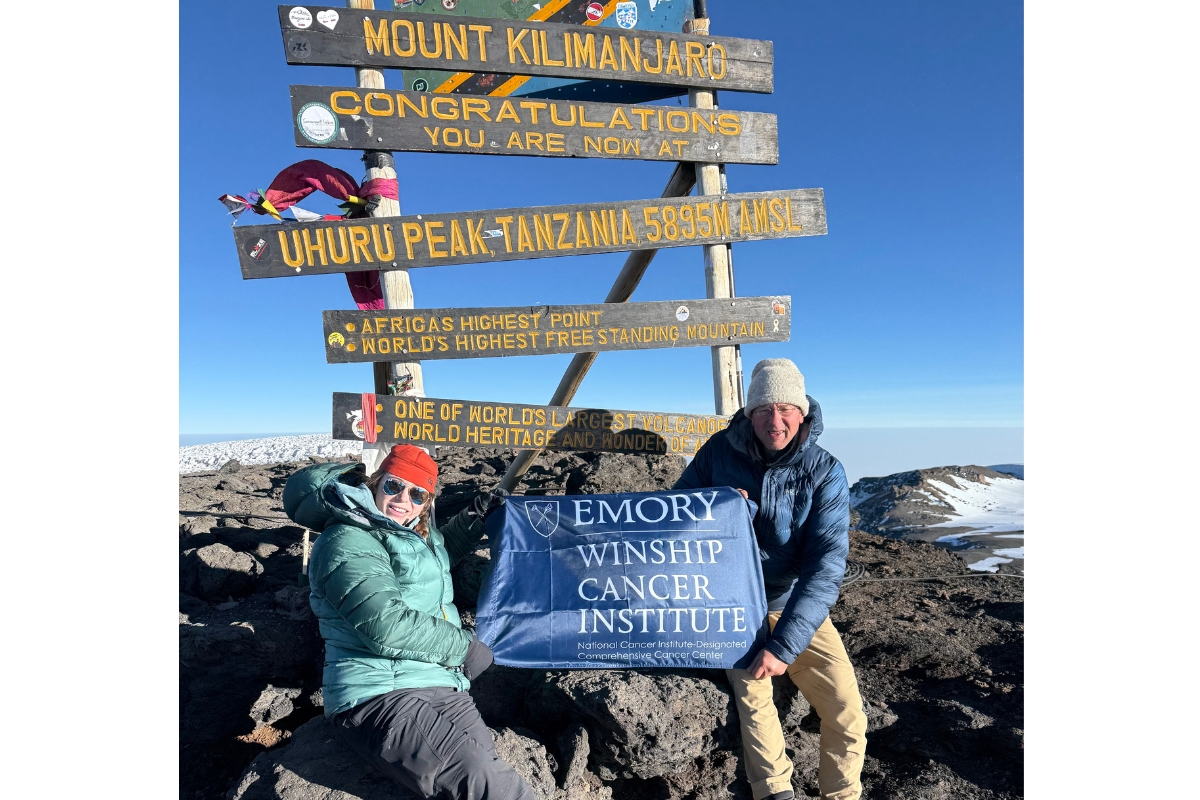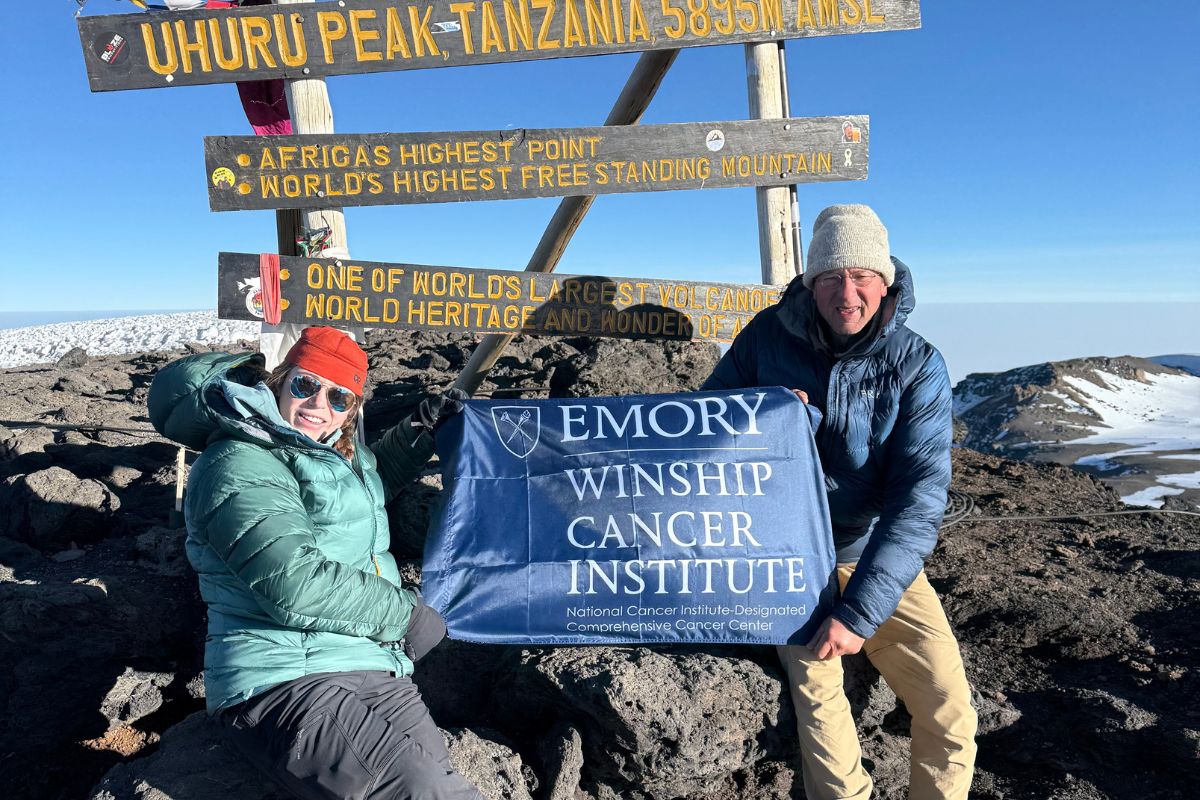You’re not alone. It’s time to go on offense. Work hard, keep moving even when you really don’t feel up to it and remember — there is a way across the bridge.
Howard's Doctor
-
Ajay Tadepalli, MD Assistant Professor, Department of Hematology and Medical Oncology

When Howard first heard the words “pancreatic cancer,” he knew exactly what they meant. Just months earlier, his wife had been diagnosed with non-small cell lung cancer — an experience that taught him firsthand how quickly life can change.
So, when doctors found a mass on the head of his pancreas in July 2023, Howard faced the news the only way he knew how: head-on. For Howard, a longtime athlete and businessman, “going on offense” has always been his approach to life.
“It wasn’t some devastating, ‘oh God, I’m going to die’ thing,” he says. “It was: OK. This is the next thing to get beyond.”
An Athlete’s Advantage

Howard and his daughter staying on the move.
Howard grew up playing competitive sports like basketball and stayed active running and biking well into his 40s. He continues to exercise daily and work on his farm. “I’ve always tried to keep myself fit and remain active,” he says. And when cancer struck, fitness became an unexpected advantage.
Both his surgical and oncology teams told him the same thing: Being in good physical shape may help you handle and recover from cancer treatment more easily.
“Staying active and maintaining a healthy lifestyle can make a big difference for patients facing cancer — not just physically, but emotionally, too,” says Ajay Tadepalli, MD, Howard’s medical oncologist. “Even small, consistent efforts to move and stay engaged can help maintain strength, boost energy and support overall well-being during treatment. Howard’s unrelenting positive attitude and persistence got him to where he is today.”
Howard underwent a complex Whipple procedure — a surgery for pancreatic cancer that involves removing the head of the pancreas, along with parts of the bile ducts, small intestine and stomach. Before and after surgery, he completed two grueling rounds of chemotherapy. He praises his entire care team for going the extra mile, even when complications kept him in the hospital for 16 days. When post-surgery issues required him to return to the hospital during the holidays, he never felt alone.
“They didn’t just let me lie there,” he says. “They stayed on it, paid attention and were engaged the whole way through.”
Howard stayed on the move, too — literally. Once out of the ICU, he made it his mission to walk 10,000 steps a day through the hospital halls, pulling his IV pole alongside him. “I regularly annoyed the nurses,” he laughs, remembering how they’d come into his hospital room to give him meds, only to find his bed empty.
A Promise and a Mountain

Howard and his daughter amidst their climb up Mount Kilimanjaro.
Amid his recovery, Howard set his sights on a promise he’d made years earlier. In 2020, he and his daughter had planned to climb Mount Kilimanjaro together to celebrate her high school graduation — a plan that was put on hold by the COVID-19 pandemic.
Lying in a hospital bed after surgery, he called his daughter and said, “We are going to do Kilimanjaro next summer.” He needed a goal. He needed a reason. That mountain became a symbol of everything he was fighting to get back to — and forward to.
He kept that promise. In the summer of 2025, Howard reached the summit of Mount Kilimanjaro with his daughter — a goal fulfilled as a symbol of hope, perspective and what it means to keep moving forward.
Hope in Motion

Howard with his daughter at the top of Mount Kilimanjaro.
Howard is quick to say that his story is not about him — it’s about what is possible when people refuse to surrender. “There’s a light at the end of the tunnel,” he says. “You can get through this, but you’ve got to work hard.”
He hopes that anyone who hears his story will take away the message that a cancer diagnosis does not mean giving up — it means gearing up. “You’ve got to go on offense,” he says again, the words like a mantra.
Howard remains deeply grateful to the entire team at Winship Cancer Institute — from his surgeons and oncologists to the nurses and technicians who cared for him through every setback and step forward.
“I could not ask for better treatment,” he says. “I was blessed to have the people I had on my team, particularly Ajay and his staff.”
Today, Howard is back to living the life he loves — staying active and reminding others that hope is strongest when it’s shared.
When asked what he would tell someone sitting where he was last year, Howard doesn’t hesitate:
“You’re not alone. It’s time to go on offense. Work hard, keep moving even when you really don’t feel up to it and remember — there is a way across the bridge.”
Care tailored to your needs
Care for patients with pancreatic cancer at Winship includes leading cancer specialists collaborating across disciplines to tailor treatment plans to each patient’s needs; innovative therapies and clinical trials; comprehensive patient and family support services; and a care experience aimed at easing the burden of cancer.

